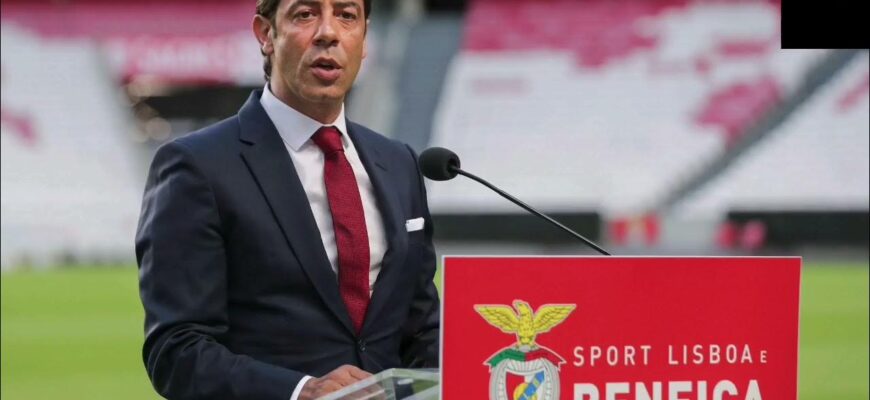In the high-octane world of professional football, club presidents are often seen juggling financial ambitions with the intricate demands of governance and fan expectations. Such is the current landscape for Rui Costa, the esteemed president of S.L. Benfica, who recently provided a candid glimpse into his strategic blueprint for the club`s future. His statements, delivered during a revealing interview, paint a picture of bold financial targets, ambitious infrastructure projects, and a surprisingly pointed critique of the club`s very own statutes.
The Television Rights Gambit: A €70 Million Vision
For a football club, broadcast rights represent a monumental revenue stream, a lifeline that fuels transfers, stadium maintenance, and youth academies. Rui Costa, currently campaigning for re-election, has made it abundantly clear that Benfica`s current television rights deal is significantly undervalued. He revealed that despite receiving offers exceeding €40 million annually – a sum many clubs would readily accept – he has unequivocally rejected them.
This stance is not merely a negotiating tactic; it`s a declaration of confidence in Benfica`s brand power. Costa views the current electoral period not as a constraint but as an opportunity to set a higher benchmark. His target of €70 million per annum for TV rights within the next two years is an audacious one, signaling a robust commitment to maximizing the club`s commercial potential. One might even appreciate the strategic delay: why secure a merely good deal now when a potentially great one could be just around the corner, especially if the electorate grants a fresh mandate?
“Benfica District”: A Vision Beyond the Pitch
Beyond the immediate financial gains, Costa detailed the ambitious “Benfica District” project, which promises to transform the club`s infrastructure and fan experience. This initiative is explicitly designed to operate independently of the club`s day-to-day footballing and sporting operations, ensuring that the financial muscle it generates is a distinct asset, rather than a drain.
The project, already attracting significant investment interest from both Portuguese and international entities, is touted as a self-sustaining venture. Its core objectives are clear:
- Enhanced Fan Experience: Providing superior facilities and amenities for supporters.
- Stadium Expansion: A potential increase in stadium capacity to 80,000 seats, a significant jump that could further solidify Benfica`s standing as a European footballing giant.
- Improved Conditions for Other Sports: Investing in facilities for the club`s diverse range of sports, underscoring a holistic development approach.
- Substantial Annual Return: Projected to generate an impressive €40 million annually, directly contributing to the club`s long-term financial stability and growth.
This isn`t merely a grand architectural blueprint; it`s a strategic move to diversify revenue streams and future-proof the club, ensuring its continued prominence both on and off the field. A visionary move, indeed, assuming the numbers, like a well-drilled defense, hold up.
A Storm on the Horizon: New Statutes and Governance Instability
However, not all of Rui Costa`s pronouncements were optimistic. He voiced strong criticism regarding certain clauses within the club`s recently approved statutes, specifically those that could lead to the downfall of a board if two financial reports are rejected. While ostensibly a democratic safeguard, Costa views this as a “danger for the future of Benfica.”
He highlighted a troubling precedent: the recent rejection of a financial report that, by all objective measures, was positive, showcasing a €30 million profit – the club`s third-best result. This rejection, according to Costa, signals a potential flaw in the system.
The underlying concern is clear: the risk of conflating on-field performance or personal popularity with sound financial management. If a board can be ousted every “six months or year” due to fluctuating fan sentiment or electoral politics rather than genuine financial mismanagement, it creates an environment of extreme instability. The irony here is palpable: a move intended to enhance democratic accountability could, in practice, render effective long-term governance virtually impossible, turning presidential tenures into fleeting moments dictated by the latest result.
The Democratic Dilemma: Participation vs. Stability
Costa further elaborated on the democratic paradox, suggesting that critical decisions, such as the rejection of financial reports that could lead to a board`s dismissal, are being influenced by a relatively small segment of the club`s membership – often only 2,000 to 3,000 voters. He argues for the implementation of mechanisms to ensure broader participation in such impactful votes.
This isn`t about stifling dissent but rather ensuring that decisions with profound consequences for the club`s trajectory reflect a wider consensus among its vast membership. To allow such a significant outcome to be determined by a minority, regardless of how passionate, seems less like robust democracy and more like a potential recipe for chronic leadership crises. It`s a delicate balance, indeed, between giving members a voice and shielding the club from perpetual administrative upheaval.
Rui Costa`s interview reveals a presidency marked by ambitious financial targets and a commitment to strategic infrastructure development, tempered by a pragmatic concern for the club`s internal stability. His vision for a €70 million TV rights deal and a revenue-generating “Benfica District” project demonstrates a clear path towards financial prowess. Yet, his candid critique of the new statutes underscores a fundamental tension between democratic ideals and the practicalities of stable, effective governance. As Benfica navigates its future, the interplay of these forces will undoubtedly define its trajectory, proving once again that running a football club is as much about boardroom battles and constitutional nuances as it is about triumphs on the pitch.









